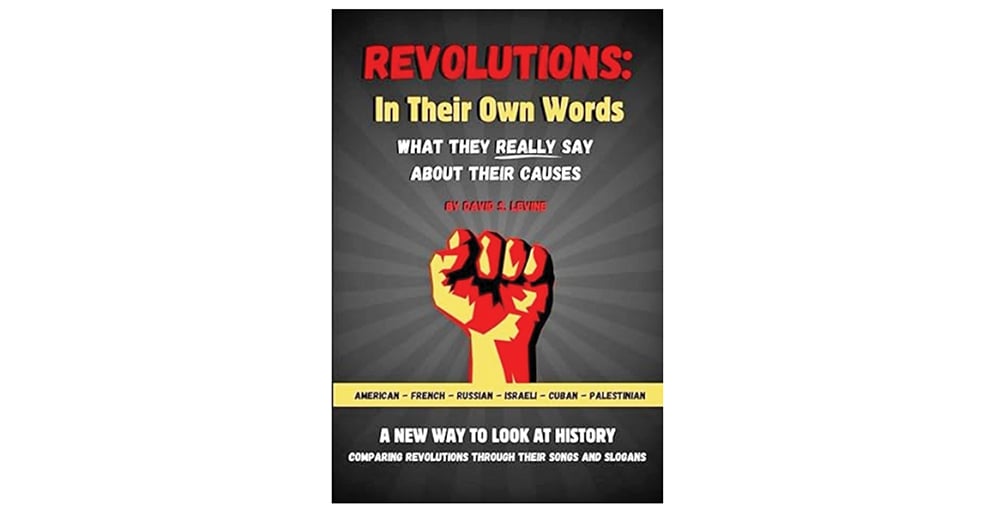
Reviewing: “Revolutions: In Their Own Words: What They Really Say About Their Causes” by David S. Levine. Self-published. 2024. Paperback. 275 pages. ISBN-13: 979-8991215107.
It is likely many readers of this newspaper will have spent significant time over the past year shouting in frustration at the TV, writing angry letters to The New York Times or The Wall Street Journal, taking to social media to air your grievances and point out the injustice at the heart of American and global media coverage of the Israel-Hamas war. Even if you do not fit into any of these categories, chances are you have discussed this with a friend or colleague or at your Shabbat table. Unfortunately, the root causes of these frustrations are unsurprising. A new book by David Levine, a former Highland Park, New Jersey resident now residing in Ashkelon, Israel, shines a light on why the media and general public get Palestinian coverage so wrong.
“Revolutions: In Their Own Words—What They Really Say About Their Causes” is a well-researched alternative type of history book, putting less emphasis on facts and tales from revolutions throughout history, with a greater focus on broader narratives and analytics. Levine starts each chapter with a brief overview of the players in each revolution and the broad strokes of history and notable events, before diving into the core, unique part of the book—comparative songs and slogans. Selecting songs and slogans for each revolution, Levine deftly paints a picture of the motives, ideals and aspirations of each revolution, peering behind the curtain to get a peek inside the mind of the revolutionary masterminds. At the end of each chapter, the reader is invited to make their own assessments and conclusions about the motives of each revolution, their ultimate success and how history changed as a result.
Levine chose six revolutions, selected for their similarities and availability of songs and slogans. Traveling chronologically throughout history, he begins with the American Revolution, followed by the French and Russian revolutions before reaching the mid-late 20th century with the Israeli, Cuban and Palestinian revolutions.
Unsurprisingly, Levine dedicates most of his attention to the Israeli and Palestinian revolutions. Beyond the initial historical outline, he offers eight appendices to further explain some of Israel’s early history and the violent narrative of Palestinian terrorist groups.
In fact, Levine initially doubted whether the Palestinian “revolution” would even make it into the book. He defines a revolution as “either the toppling of a king/dictator or the ousting of a foreign/colonial government.” This definition, as the author points out, cannot be applied to the actions of Palestinian terror groups. Yet, despite not fitting the theme of the book, Levine’s analysis of the Palestinian revolution teaches an important lesson.
Following a guiding principle of compare and contrast, Levine takes the reader on a journey through history, showing how multiple revolutions have centered on ambitions for freedom and hope for a new future. That is until we reach the Palestinian “revolution.”
Using key texts from infamous terror groups Fatah, Hamas and Hezbollah, Levine demonstrates just how different the Palestinian revolution is. In doing so, he paints a clear picture of the perversity of the world today. People on the far left mistakenly believe that representatives of the Palestinian people have their people’s interest at heart. What many readers already know, and Levine exposes, is this is completely false.
There are no messages of hope to be found among the songs and slogans of Palestinian revolutionaries, no visions of a two-state solution, no platitudes of peace. Instead, violence, terror and murder are the key themes. Rather than projecting our hopes, dreams and expectations onto revolutionaries, as many seem to today, Levine pulls the curtain back to reveal the true evil face of the Palestinian revolution.
There are clear benefits to learning about revolutions, it gives an insight into not only the revolutionary leaders themselves, but how the public perceives and remembers each revolution. In the post-October 7 landscape, this analysis takes on greater importance and is worth reviewing to better understand the world today.
“Revolutions: In Their Own Words” should be integrated into educational resources on the Israel-Palestinian conflict. Rather than dictating to readers what they should think, Levine allows everyone to come to their own conclusion. However, the evidence is overwhelming and it is difficult to imagine that when presented with the facts, readers could still believe that the Palestinian revolution is righteous or enacted with good intentions.
Available on Amazon https://amzn.to/3T17NyZ
Daniel Davis is a senior account executive at FINN Partners, a communications firm with offices on three continents. He lives with his wife in Jerusalem.










